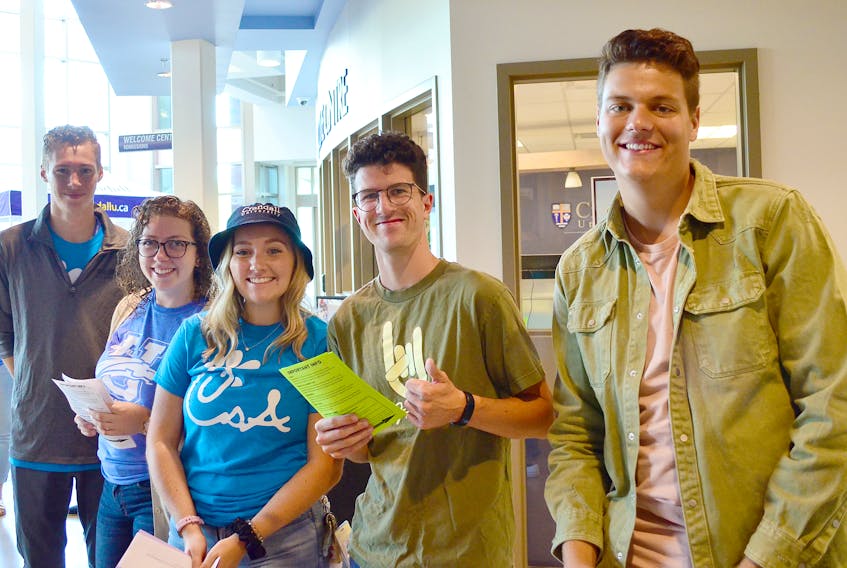A private, Christian university in Moncton is growing its student enrolment this year despite a global pandemic that has forced it to convert a storage room, auditorium and student lounge into temporary classrooms.
“We’ve created four new classrooms,” said Jon Ohlhauser, Crandall University’s provost and vice-president of academic affairs.
“We had a large storage unit in one of the buildings that was converted. We also had an auditorium where we can teach up to 87 students while social distancing.”
The student association sacrificed the daytime use of a lounge for use as a classroom.
By converting that space to allow students to socially distance, Crandall increased its classrooms to 22 from 18.
University officials throughout North America are worried about declining enrolments due to COVID-19 travel restrictions and public health and safety guidelines.
But Crandall is growing. It had 825 students last year, and that’s projected to increase by almost six per cent this year.
“All of the numbers suggest that if international students are still able to register with us and go through the process (to get study permits from the Canadian government), then we should be looking at 875 students this fall,” said Ohlhauser.
The magic number
A non-profit organization, the university enjoyed the slimmest of surpluses in 2018-19, roughly $23,500 on an annual budget of about $9 million.
It wants to boost that to about $14 million by upping enrolment.
“When you talk about a university that is trying to survive and be viable, the magic number is around 1,200 students,” said Ohlhauser.
“Under that, you can’t offer the same number of services,” he said.
“It would be next to impossible to meet that growth based on domestic demand. . . . Our best track to meet that growth is with international students.”
International students hold a lot of promise because they pay more in tuition fees and there are a lot more of them.
“Their tuition is typically 150 per cent of that of a domestic student,” said Ohlhauser.
“At Crandall, a typical undergraduate, domestic student pays about $8,800 (in tuition per year).”
At the graduate level, Canadian students pay about $14,000. An international student will pay about $20,000.
There are, though, added costs to the recruitment and retention of international students.
“It takes about $1,800 to $2,000 to recruit a domestic student but about $2,500 for an international student,” said Ohlhauser.
Universities also spend more on cultural activities and orientation for international students in a bid to help newcomers feel welcome.
Despite those costs, international students are a cash cow for Crandall and other universities.
Ottawa’s approach to international students is seen as an asset for universities.
New rules
Under new Canadian rules, international students can get a study permit even if they begin their courses online from their home countries for up to 50 per cent of the duration of their academic programs. In July, Ottawa further sweetened the deal by promising to fast-track applications for study permits.
International students who can’t submit all the documentation to complete applications can provide biometric information such as fingerprints and photographs in a two-stage application process.
Canada’s approach to attracting international students seems to be working. Over the past four years, the country has seen a 56.4 per cent jump in study permit holders.
That’s far better than south of the border. In the United States, the number of new international students has dropped almost 7.4 per cent since President Donald Trump took office.
American university officials are worried international enrolment there will drop as students choose places like Canada over the U.S.
“New international student enrolment was already down before the coronavirus pandemic, and it will most certainly be exacerbated now,” the NAFSA: Association of International Educators wrote in a brief in May.
Ottawa’s latest overtures to international students, though, are not expected to make much of a difference in Crandall’s enrolment this fall because most students applied before the changes came into effect. There is a backlog of study permits waiting to be processed.
According to Ohlhauser, Crandall sent out roughly 300 acceptance letters for international students and would typically expect about 150 to show up on campus in September. But the backlog has led the university to lower its expectations.
“We had hoped it to be a big growth year but it will be a level one and we will be at the break-even point,” said Ohlhauser.
Crandall is expecting only 75 international students to come in September, with the spike to come in January.
In addition to creating more classroom space, Crandall is requiring the wearing of facemasks in public places where social distancing cannot be observed. Arrows have been placed on the floors to direct the flow of traffic. The university has also hired two more cleaners to disinfect desks and high-traffic areas.
When the pandemic hit, Crandall immediately switched to offering courses through distance education and Microsoft Teams. Many universities are going to continue the online approach.
But Crandall, along with Mount Allison and St. Francis Xavier universities, decided to go back to in-person education for the fall semester.
That’s a big selling feature for international students, said Ohlhauser.
“They are looking for relational connections,” he said.
“They understand that if they are going to immigrate to Canada, they need to develop networks. . . . The greatest transformation is done in person.”
The Pivot is a regular business feature showcasing an Atlantic Canadian company adapting to new market realities with innovative products, services or strategies. To suggest a business, email [email protected].








